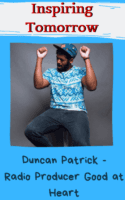May is dubbed ‘Africa Month’ and ‘diversity’ is one word that comes to mind when you think about the motherland. Duncan Patrick (28), an executive producer at Heart FM, has experienced both the bad and good sides of diversity.
“I’m from Strandfontein in Cape Town. My dad is Indian and my mom is coloured. I look Indian, but I grew up in a coloured community and I went to a school that was predominantly white in Fish Hoek. My dad is from Durban and Mom is from Bellville – I’m in the middle trying to navigate these two different worlds. Growing up I struggled with what you’d call an identity clash.” Duncan recounts his experience:
“I didn’t have any friends in Strandfontein; all my friends were in Fish Hoek. I was called a ‘coconut’ several times. I wasn’t coloured enough for the coloured kids and I wasn’t white enough for the white kids either. It can be difficult ‘cos you spend time trying to understand other people just so you can fit in, and neglect yourself along the way.”
Duncan looked for the stars in the dark times of his life and for the rainbow on his rainy days.
“I became good at understanding people. I kind of moulded myself to assimilate accordingly. But it taught me a lot and now I’m older and more secure in my own identity. It’s allowed me to understand people from different perspectives, and Anthropology and Sociology also helped me a lot…”
Duncan holds a degree in Anthropology and Sociology from the University of Cape Town (UCT). That’s where his radio career took off on the air.
“My journey into radio was totally accidental. I was always interested in the medium. One day Goodhope FM came to my school and I wanted to know what the inside of a broadcast van looked like. I studied audio production and I realised I was terrible at it. It wasn’t a good year for me but I got my qualification in 2010. In 2011 I applied to UCT and I managed to get in.
“The first thing I did when I got there was go to the UCT Radio station and sign up. I got some training and got my own radio show. I remember clearly doing that show, nervous as hell. I was alone but I was all hyped up and I had the mic on. It was a weird sensation. I got a relaxing feeling.”
Duncan finally made the cut.
“I eventually got my first breakfast show. That was the foundation of the ‘Rise and Grind breakfast show.’ I spent roughly five years doing the show. My co-host and I won an award for best campus show at the Radio Awards. I was nominated for best breakfast presenter. I lost out on that but it was an honour to be nominated.” He adds that he ended up as the programme manager at UCT Radio, working with young talent.
The radio world then awaited Duncan.
“I graduated in 2014, obviously you’re now eligible to go work. I tried getting into various radio stations. You never end up where you want to. I sent out my demos to various places and got rejected – you never really understand why. Eventually, I got a job at Heart FM in 2015 for an overnight show on weekends, as well as the breakfast show at UCT Radio during week days. That meant long hours and lots of sacrifice. That went on for a year but it was all worth it.”
Duncan, in his capacity as an executive producer, has seen quite a lot, but the ‘glamourous side’ of radio hasn’t been part of it.
“The perception is radio is a glamourous medium where you’re constantly rubbing shoulders with celebrities and big shots – but it really isn’t! It’s an extremely challenging job. You are trying to form connections and emotional bonds through content with over 600 000 people. You’re trying to connect with each and every single one of them on a different level. To do that takes research, team work, and plenty of planning. You’ve got to rely on the team. It’s a stressful medium that requires versatility.”
In a bid to advance his radio skills and knowledge, Duncan saw it fitting to go back to varsity.
“I went back and got my postgrad qualification in marketing from UCT and I brought that fresh perspective on air and re-looked at the way we marketed and approached our content. That shift in thinking helped me a lot. I’m looking at doing my MBA next year to expand my knowledge further. I’m looking forward to seeing how the youth impact radio – I would like to be part of that process. I want to be highly influential in the transformation of radio in this country.”
He concludes by emphasizing the importance of education, more especially to the ‘people of colour.’
“To people of colour, specifically, education is a tool for navigating and opening up doors which are often closed to us; to open up avenues we never thought we could access. Considering the societal state we’re in, it’s important to do everything in our power to get educated. If I look at myself in 2010 I don’t think I’d be where I’d be today.
“It’s not just a degree for us. It’s a key to opening a viable, sustainable future for you and the future that follows. It doesn’t have to be a UCT degree it can be any qualification from any credited institution. You just need to unlock that skill that lies in you.” He presses stop.
***
Tell us: How does Duncan’s story make you feel?





